TECHNICAL REPORT
| Grantee |
Digital Education Limited (Code Avengers)
|
| Project Title | INDIGITECH PacifiCODE Project - Samoa |
| Amount Awarded | USD 150,000 |
| Dates covered by this report: | 2023-01-01 to 2023-09-30 |
| Economies where project was implemented | Samoa |
| Project leader name |
Ray Allen
|
| Partner organization | E3 Rural Samoa Trust - local NGO in Samoa, Bluewave Wireless Company Limited, LiteHaus International, Community organizations and leaders, Local ministries |
Project Summary
Indigitech PacifiCode was a collaborative project that addressed the needs identified by the E3 Rural Samoa Trust (E3) - the lack of digital skills and under-representation of Samoans in STEM fields. The project implemented a pilot program in 10 schools to increase each school's capacity to deliver ICT/DT education and tracked its success, reporting to the Samoan government. The PacifiCode Digital Fluency Project, a pioneering initiative funded by a $150,000 USD Impact Grant from the APNIC Foundation, has made significant strides in advancing digital literacy and technology education in Samoa. This project was designed to address the digital divide and foster digital fluency among teachers and students, particularly focusing on remote and rural schools. Project objectives: Capacity Building: Providing Professional Development to a team of facilitators in Samoa, enabling them to deliver the certification program developed by Code Avengers. 5 in-country facilitators went through digital education professional development Supplying high-quality devices and internet data to facilitate access to online learning platforms: 111 high quality laptops were distributed to the 10 Pilot Schools, including a 3 year data package to each school. Enhancing teachers' skills in ICT and Digital Technologies (DT) through a comprehensive Professional Learning Development Certification Program, and subsequently establishing ICT after-school programs led by these newly certified teachers: 40 of 62 Teachers have completed their ICT/DT PLD Certification, and have established an ICT/DT After-school program at each of their schools, with 953 students engaging on ICT e-learning platform and program. Increasing female participation in ICT/DT education in the participating schools: Almost 50% of participating students were female (411). A cornerstone of the project was the Professional Learning Development (PLD) Certification Program in Information and Communication Technology (ICT) and Digital Technologies (DT). This program aimed to elevate the digital competencies of teachers, equipping them with the necessary skills to integrate technology into their teaching practices effectively. A total of 62 teachers from 10 selected schools participated in this intensive training, which included 40 PLD sessions, each lasting 6 hours. These sessions were meticulously planned and executed over a period from March 6th to June 16th, 2023. In addition to the teacher training, the project placed a strong emphasis on gender equity and inclusion. Notably, nearly half of the active users on the e-learning platform were young women, demonstrating the project's success in engaging female students in STEM fields. The project also addressed infrastructural challenges by sourcing and installing 111 high-quality computers in the participating schools and providing three years of internet data access. This initiative ensured that students and teachers in these schools could access vital e-learning resources, bridging the gap in digital access.
Table of Contents
- Project Factsheet Information
- Background and Justification
- Project Implementation Narrative
- Project Review and Assessment
- Gender Equity and Inclusion
- Project Communication
- Project recommendations and use of findings
- Bibliography
Background and Justification
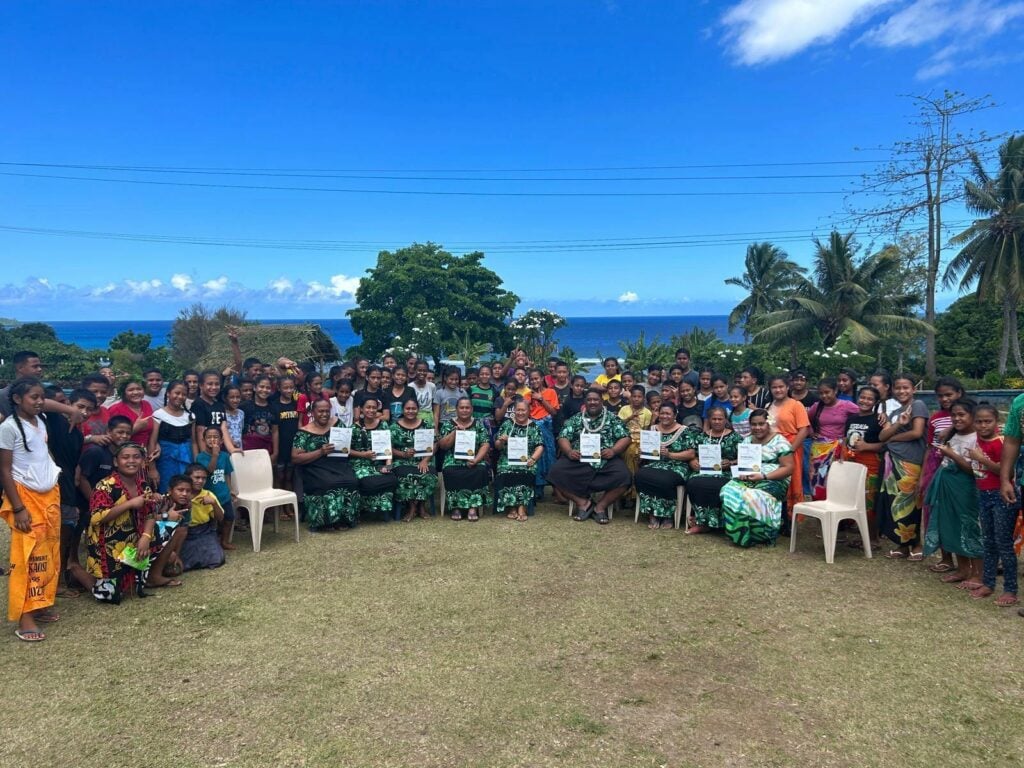
Before the start of the project, E3 had made significant progress in connecting Samoan schools to the internet via satellite. However, they faced several challenges that underscored the relevance of the project in their scenario. Schools had limited access to online learning platforms, and the availability of functioning laptops or PCs was scarce. Additionally, teachers had minimal experience in using online learning platforms, and their confidence levels in teaching ICT were low.
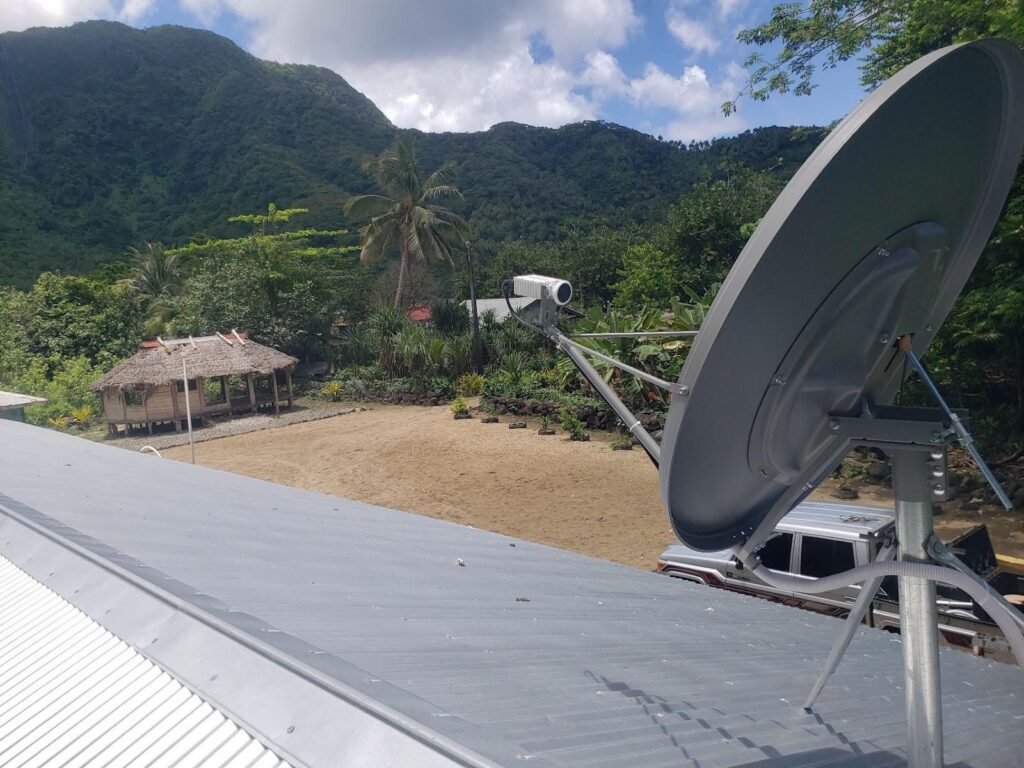
In 2021, Code Avengers conducted a successful three-day Code Camp delivered by the E3 team at Si'ufaga Seventh Day Adventist Primary School in Savai'i. While the event positively impacted the participants, it was not a sustainable solution. It benefited only one school and a limited number of students who attended the camp. The teachers received minimal professional development, lacking clear pathways for further delivering ICT programs in their classrooms. The E3 team gained some confidence in using the Code Avengers platform but had limited exposure to the full range of teaching tools available in the Teacher Dashboard.
The motivation of E3 Samoa Trust and Code Avengers stemmed from the belief that for Samoan children to thrive in the digital age, they needed a strong understanding of digital language. Equipping schools with the necessary tools for transformative learning was seen as crucial. Code Avengers, with its courses designed by global curriculum experts, aimed to provide job-ready digital skills to underprivileged students. The vision was for all schools in Samoa to have access to Code Avengers as the "Gateway to the Digital World," as expressed by Ray Allen, the Vice President of the APAC region. According to global reports, there was a shortage of adults with basic STEM skills and fluency in digital technologies, along with an under-representation of Indigenous people, females, and people with disabilities.
The collaborative effort between E3 and Code Avengers aimed to develop a sustainable solution that reduced reliance on external partners. The goal was to empower the facilitators in Samoa to effectively utilize the Code Avengers platform and provide guidance to teachers in becoming certified and implementing ICT programs at their schools. This pilot project served as a blueprint for success, with the intention of expanding it to all schools in Samoa in the near future. By building local capacity and ensuring long-term sustainability, the project strove to create lasting impact and digital fluency among Samoan educators and students.
What is the problem(s) that the project seeks to solve?
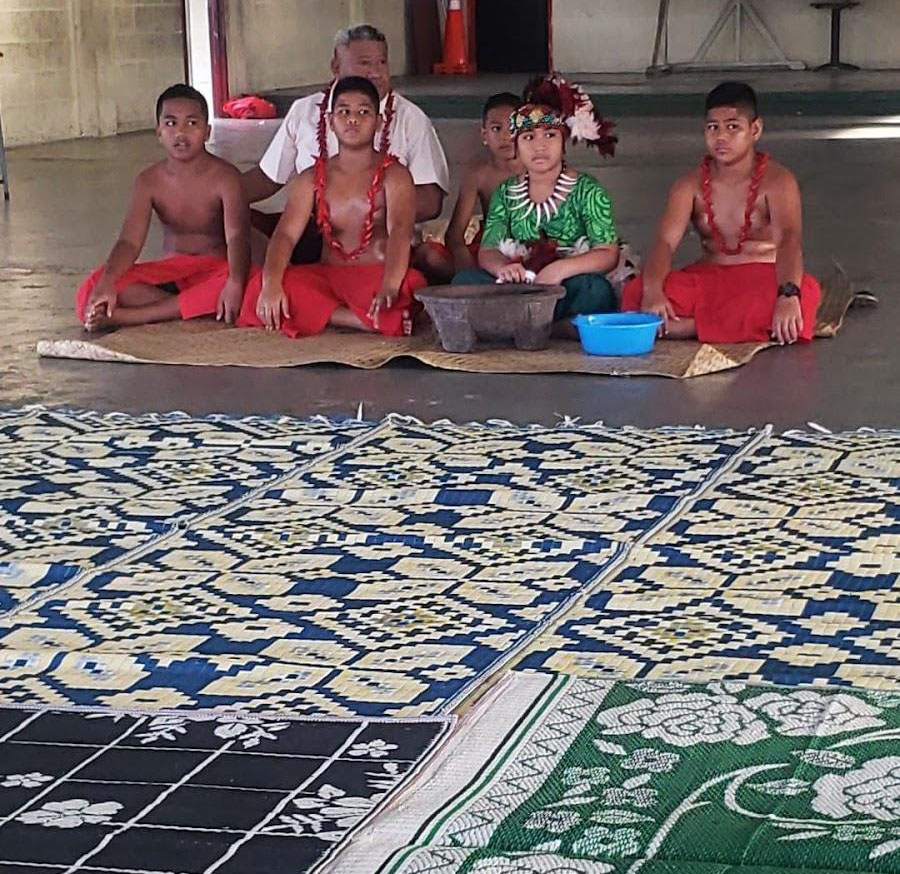
Digital Skills Gap: In many Pacific Island nations, including Samoa, there's a notable gap in digital literacy and skills. PacifiCode seeks to bridge this gap by providing comprehensive ICT education, ensuring that the upcoming generation is equipped with essential digital skills.
Underrepresentation in STEM Fields: There's a historical underrepresentation of Samoans and Pacific Islanders in STEM (Science, Technology, Engineering, and Mathematics) careers. By fostering ICT education from a young age, PacifiCode aims to inspire more students to pursue careers in these fields.
Gender Disparity in Technology: The project also targets the gender gap in technology and STEM fields. By encouraging female participation and success in ICT education, it aims to challenge and change the existing stereotypes and barriers faced by women in tech.
Limited Access to Quality Educational Resources: Many schools in Samoa and similar regions lack access to high-quality educational resources, especially in ICT. PacifiCode addresses this by providing not only training but also essential resources like high-quality devices and access to the Code Avengers e-learning platform.
Educator Preparedness: A key challenge is the preparedness of teachers to deliver modern ICT education. The project includes professional development for teachers, equipping them with the skills and confidence to teach ICT effectively.
Sustainable Educational Development: Beyond immediate educational needs, PacifiCode aims to establish a sustainable model for ICT education that can be replicated and scaled, ensuring long-term benefits.
Economic Empowerment and Job Readiness: By equipping the youth with digital skills, the project contributes to their economic empowerment, making them job-ready for the modern workforce, which increasingly demands digital fluency.
Cultural Relevance in Education: The project also addresses the need for culturally relevant education, ensuring that the content and delivery methods resonate with the local context and culture.
Are you aware of any previous attempts to tackle it?
There have been a number of solutions tried to help solve some of the above issues, most notably the SchoolNet Project which main objects were to connect schools via satelitte and distribute devices to each of the schools. “ The free WIFI School connectivity project was devised by the FAST Party ahead of last year’s general elections. The project was a response to the lack of connectivity in Sava'ii schools and the impact of the Measles epidemic isolation and lockdowns on physical classroom learning.
It also followed major criticisms of the multimillion dollar Samoa National Broadband Highway (SNBH) which was to deliver the SchoolNet Project, to provide connectivity for schools around the country.”
Every year there are a number of STEM workshops run, by different organizations but none are truly sustainable and help to build capability into a local ecosystem, they are almost always foreigners running workshops and taking their capabilities and intellectual property with them when they leave Samoa.
What is the motivation of your organization and team members to do this project and offer a solution?
What is the project’s theory of change?
Code Avengers is driven by a deep-rooted motivation that stems from our indigenous Maori ownership. As a Maori-led organization, we feel a profound connection to our Polynesian heritage, which inspires us to extend our reach to our Pacific Island cousins. This outreach is more than just sharing knowledge and skills; it's a rekindling of our ancestral legacy of navigating the vast Pacific Ocean, settling islands, and fostering the prosperity of our people. Our engagement in this project is a modern expression of that enduring spirit of exploration, connection, and advancement within the Polynesian community.
Secondly, our passion for digital education forms the cornerstone of our mission. At Code Avengers, we are deeply committed to ensuring that the next generation is not only prepared but also empowered to thrive in the rapidly evolving digital landscape. We believe that equipping young minds with digital skills is crucial for their future success. Our dedication goes beyond mere instruction; it's about inspiring a sense of digital fluency and confidence in young learners. By providing them with the tools and knowledge to navigate, create, and innovate in the digital world, we are opening doors to endless possibilities and opportunities. This commitment to digital education is a testament to our belief in the transformative power of technology to uplift communities and shape a brighter, more connected future for the next generation.
The theory of change for the PacifiCode project can be conceptualized as follows:
- Identification of the Problem: The project recognizes a significant gap in digital skills and underrepresentation of Samoans, particularly women, in STEM fields. This gap is seen as a barrier to economic and social development in Samoa and the wider Pacific region.
- Intervention Strategy: To address this, PacifiCode focuses on implementing a digital fluency pilot program in selected schools. This involves:
Professional development for teachers and facilitators through workshops and training sessions.
Providing access to high-quality digital devices and the Code Avengers e-learning platform.
Developing a curriculum that is culturally relevant and engaging, with a particular emphasis on increasing female participation in ICT. - Short-Term Outcomes:
Teachers and facilitators become proficient in delivering ICT education.
Students, especially girls, gain increased access to and engagement with ICT education.
Enhanced digital literacy and interest in STEM fields among students. - Intermediate Outcomes:
Schools integrate ICT education into their regular curriculum.
Community and government recognition of the importance of digital education.
Increased collaboration between educational institutions, government, and private sector for digital education initiatives. - Long-Term Impact:
A significant increase in the representation of Samoans, particularly women, in STEM careers.
A digitally fluent generation that can navigate and innovate in a technology-driven world.
Socio-economic development in Samoa and the Pacific region through a skilled workforce capable of meeting the demands of the digital age. - Sustainability and Scaling:
The project aims to demonstrate the effectiveness of its approach to the Samoan government and other stakeholders, seeking broader implementation across Samoa and potentially other Pacific nations.
Continuous monitoring and evaluation to refine and adapt the program for scalability and sustainability. - Vision for Change:
Ultimately, the PacifiCode project envisions a future where digital fluency is a cornerstone of education in Samoa, leading to greater economic opportunities, gender equality in STEM fields, and a robust, innovative society that leverages technology for development and prosperity.
Project Implementation Narrative
The Story of the PacifiCode Digital Fluency Project
Problem Statement: In Samoa, a significant digital divide and underrepresentation in STEM fields, particularly among Samoans, posed a critical challenge. Remote and rural schools lacked access to digital skills and technology education, hindering the development of a digitally fluent generation.
Project Inception: The E3 Rural Samoa Trust (E3) identified these gaps and initiated the PacifiCode Digital Fluency Project. Funded by a $150,000 USD Impact Grant from the APNIC Foundation, the project aimed to address these challenges by implementing a pilot program in 10 schools across Samoa.
Objectives: Capacity Building: Enhance the digital education capabilities of local facilitators to deliver a specialized certification program. Resource Provision: Supply high-quality computing devices and internet data to facilitate access to online learning. Teacher Training and After-School Programs: Develop teachers' skills in ICT and DT through a Professional Learning Development Certification Program and establish ICT after-school programs. Gender Equity in ICT/DT Education: Increase female participation in ICT/DT education.
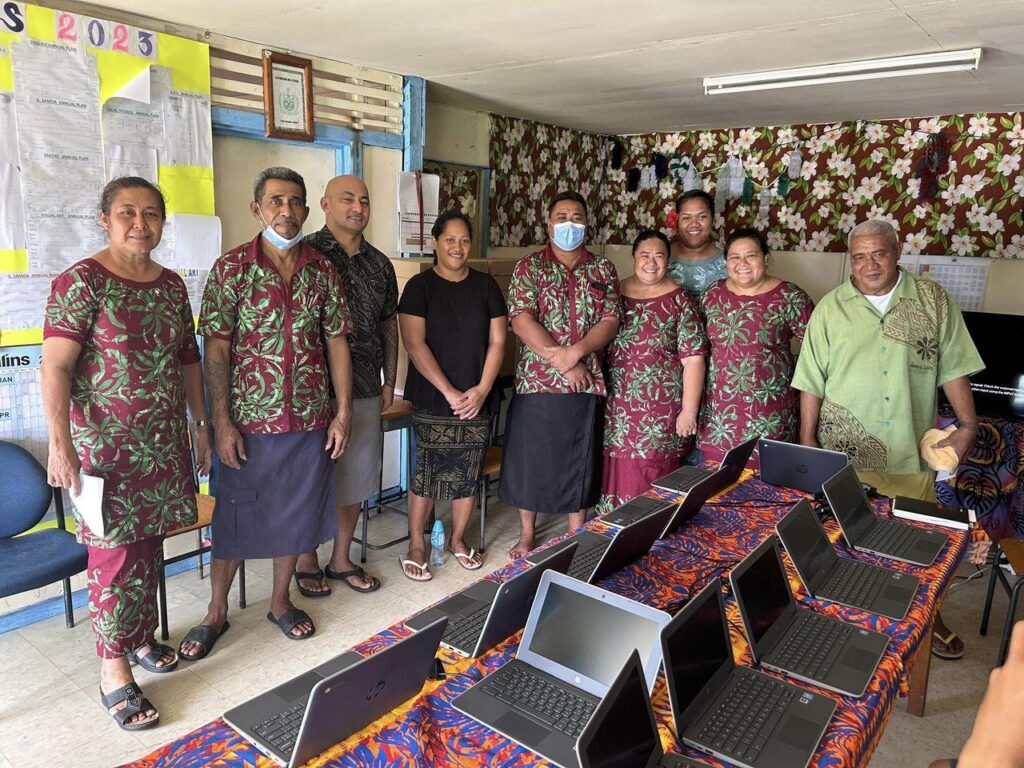
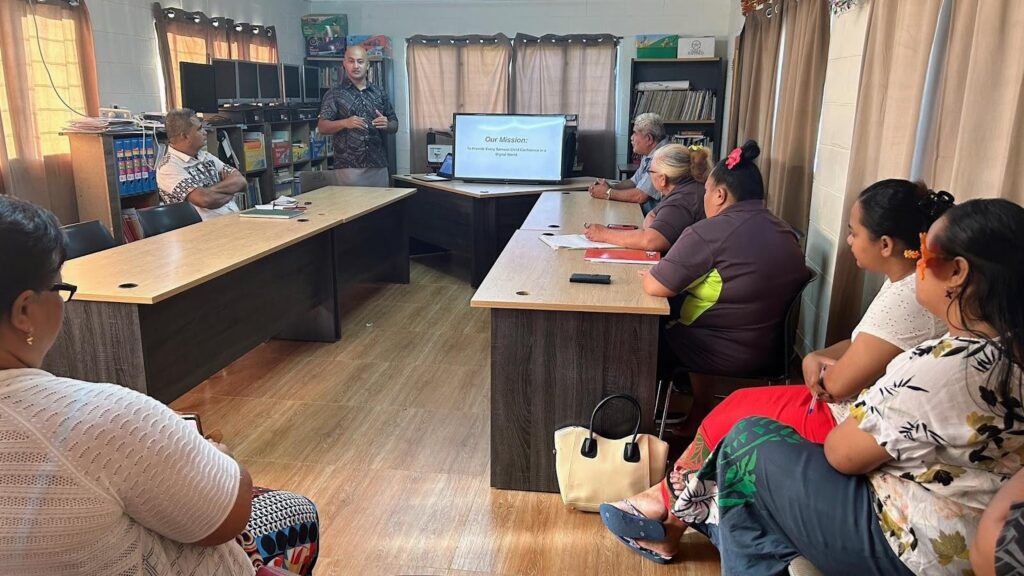
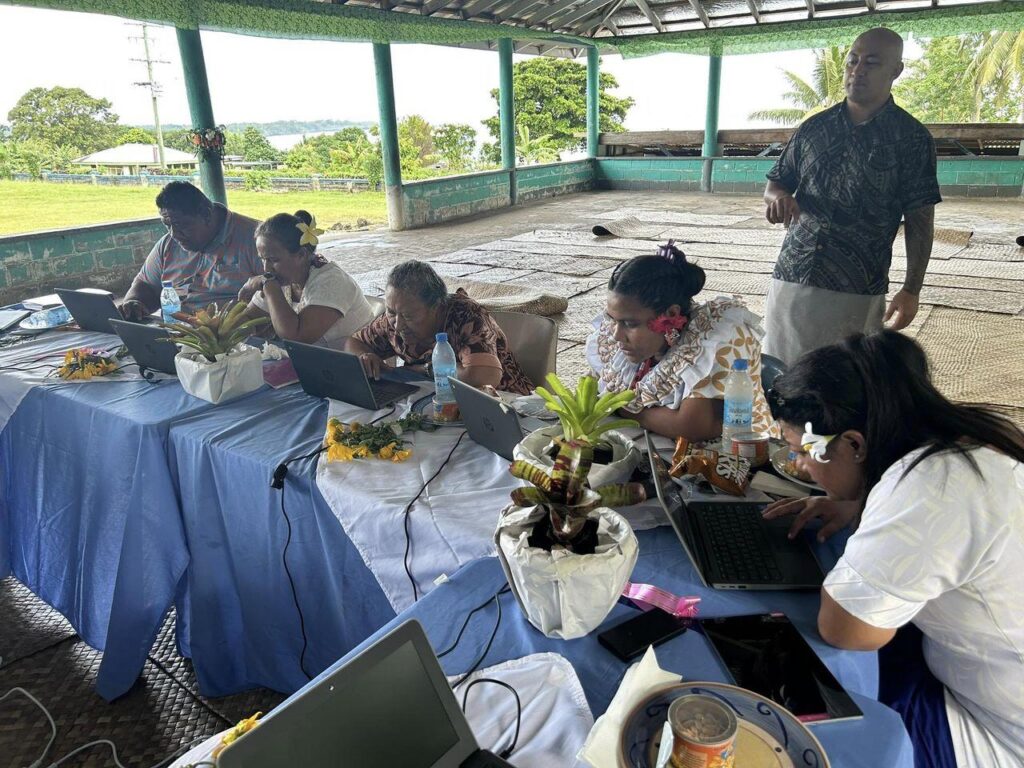
Distribution of Technological Resources: To bridge the digital gap, 111 laptops were distributed among the 10 pilot schools, each equipped with a three-year data package. This ensured that students and teachers had the necessary tools for online learning.
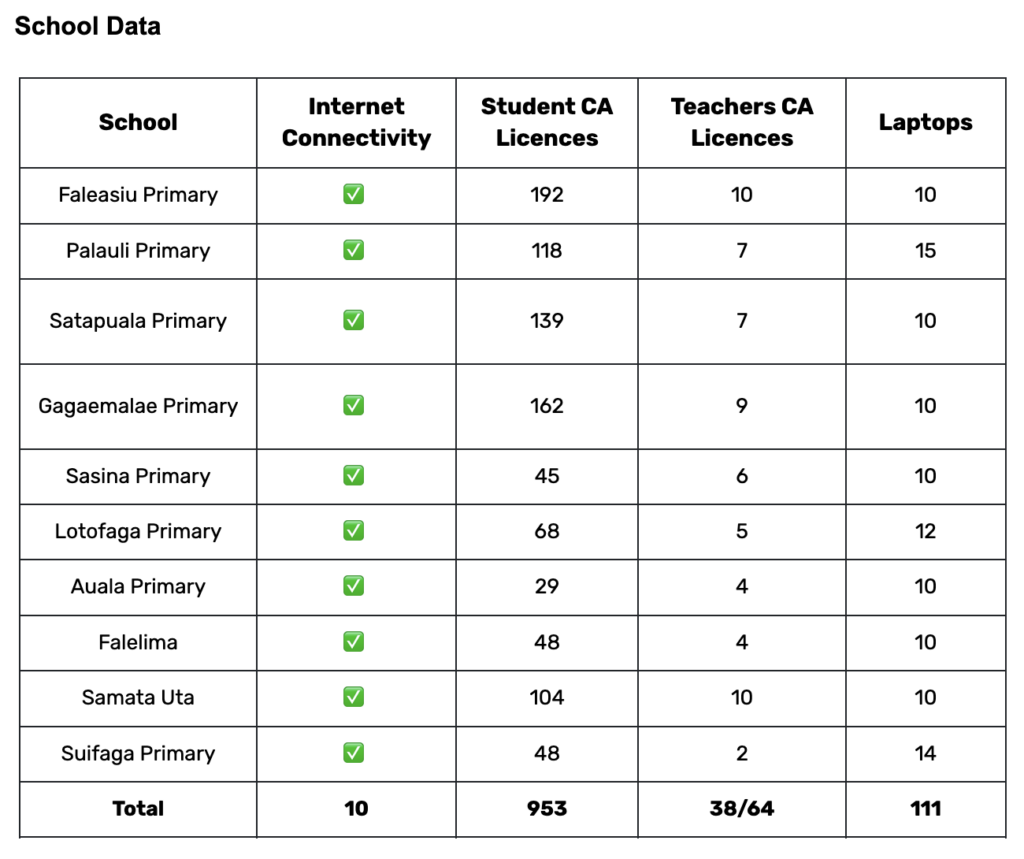
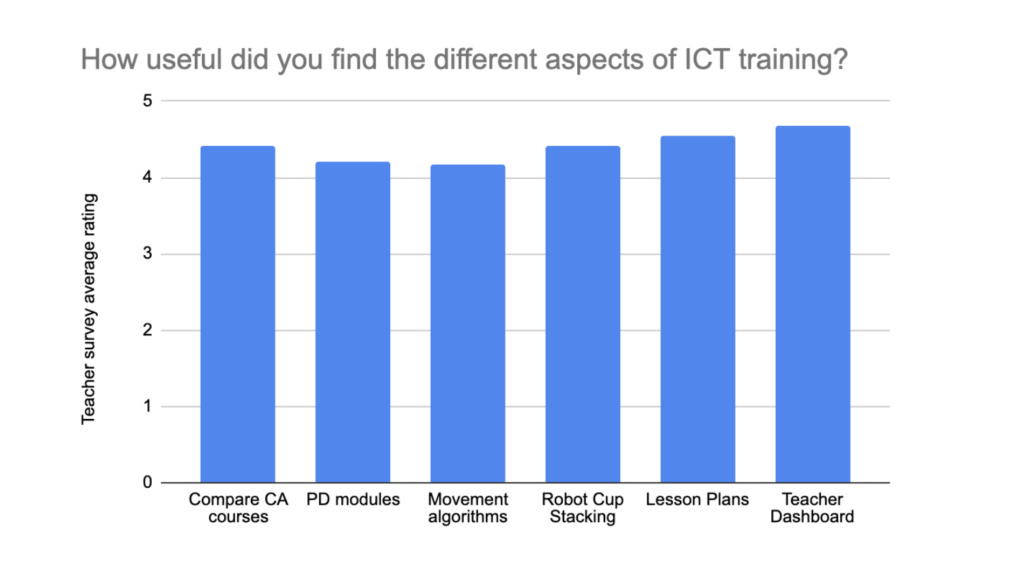
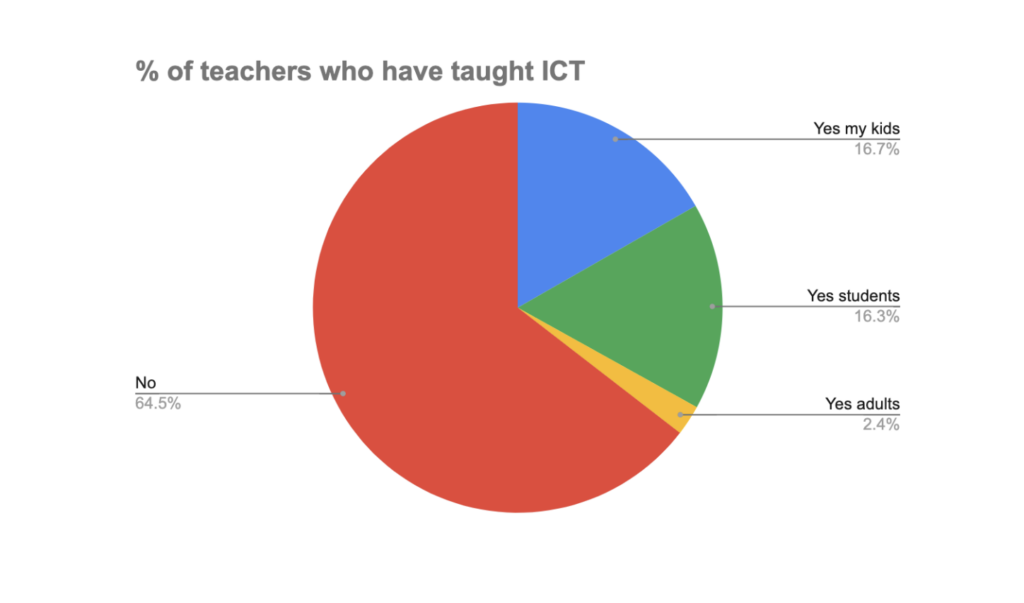
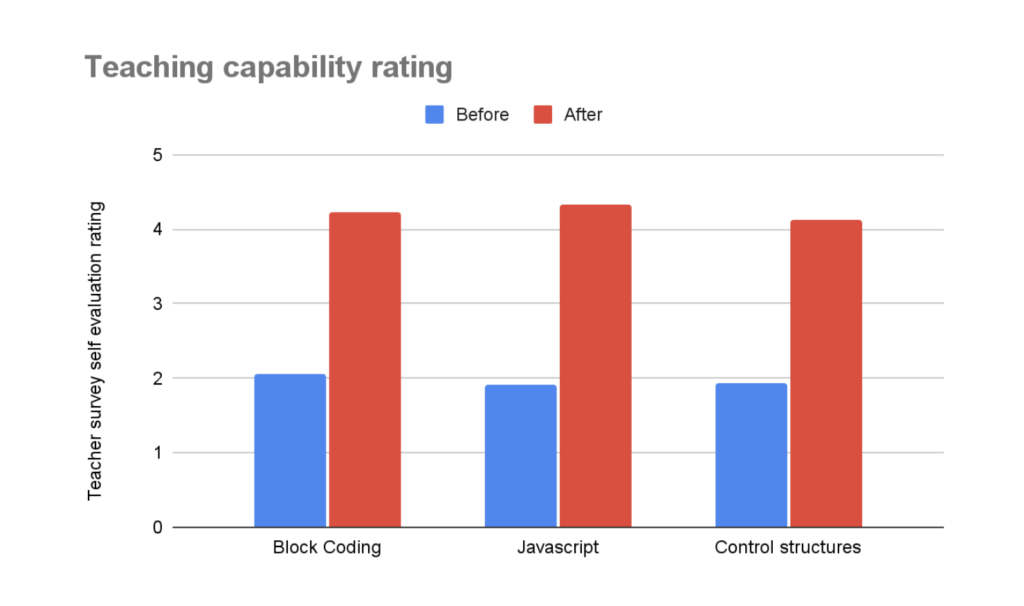
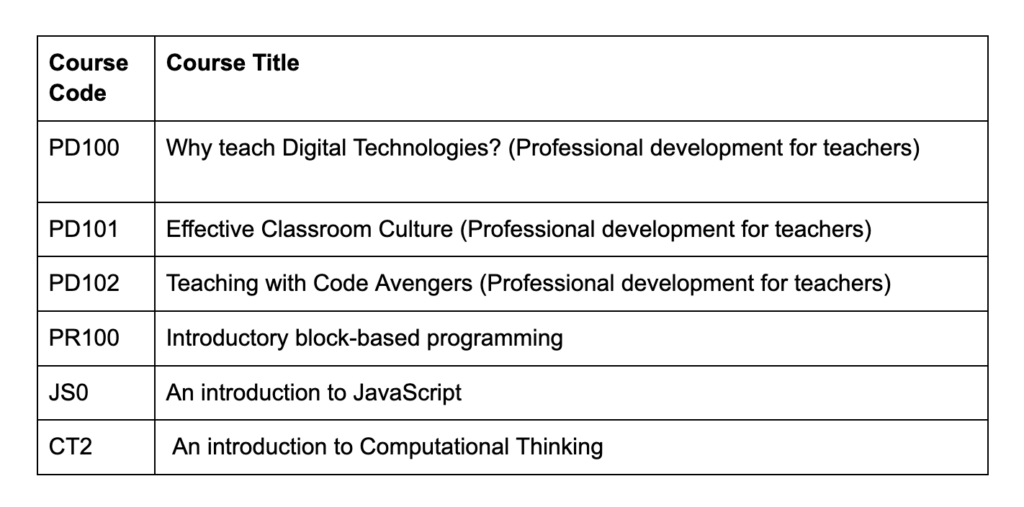
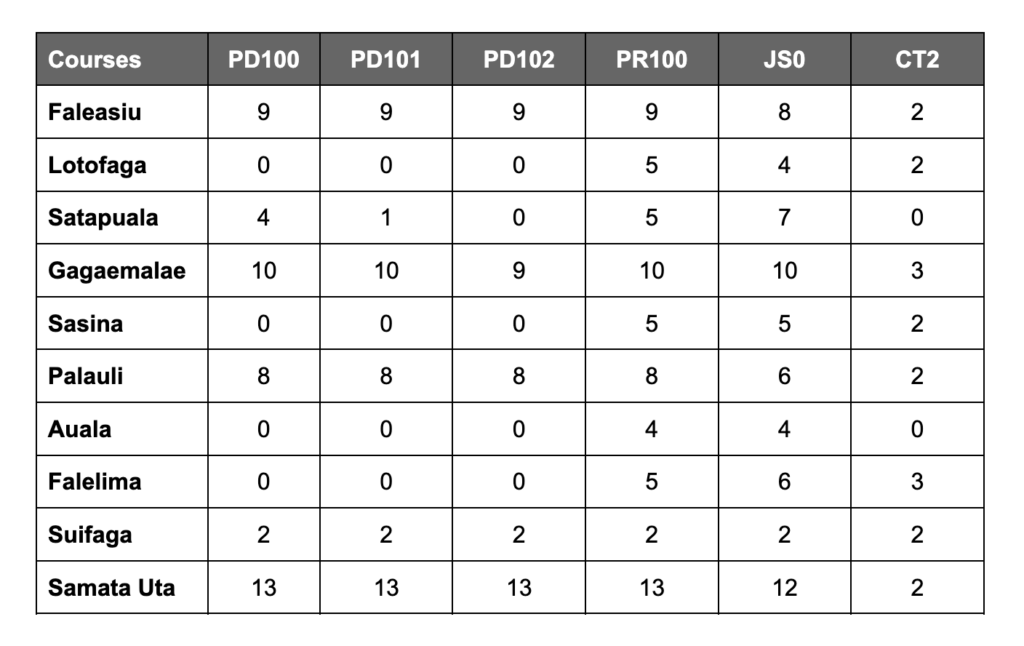
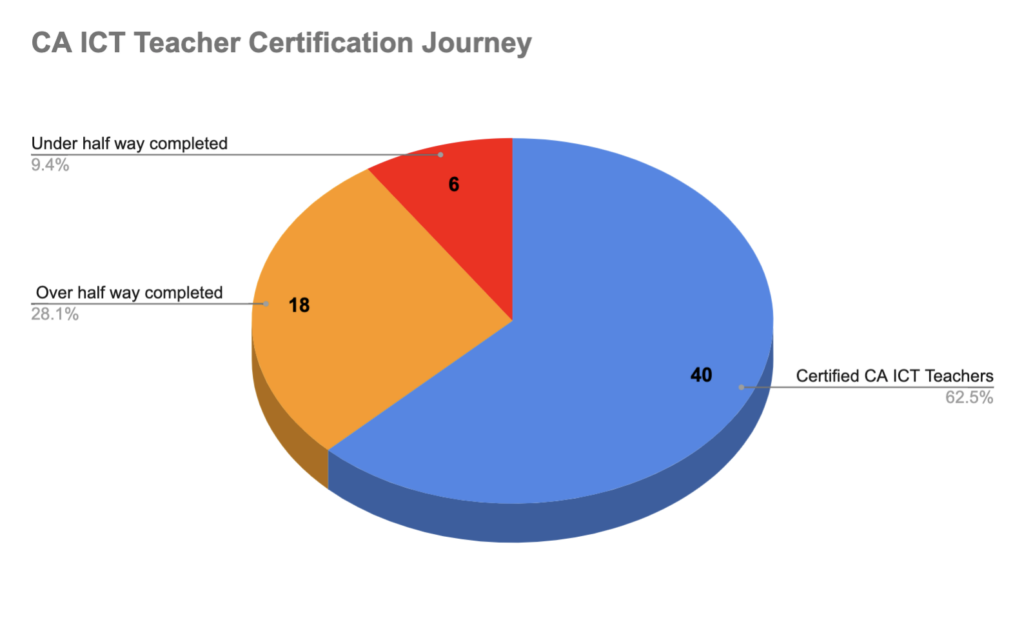
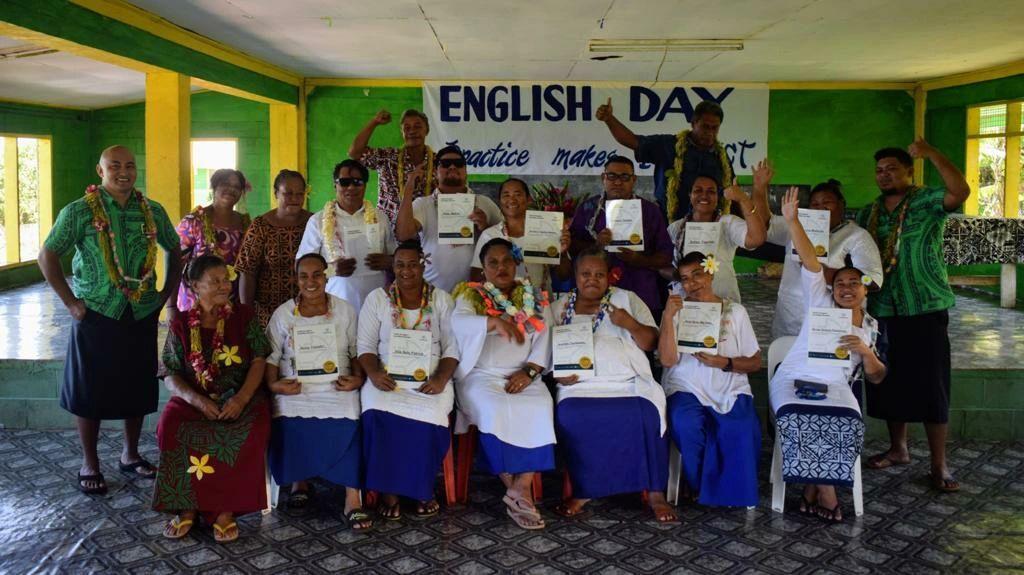
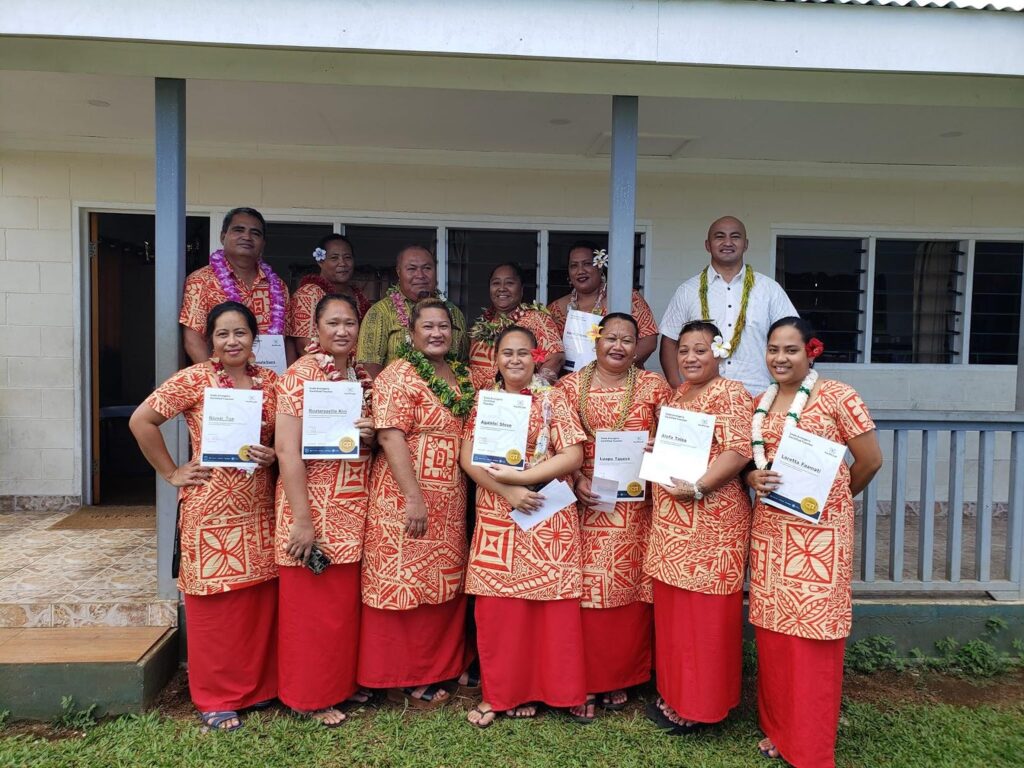
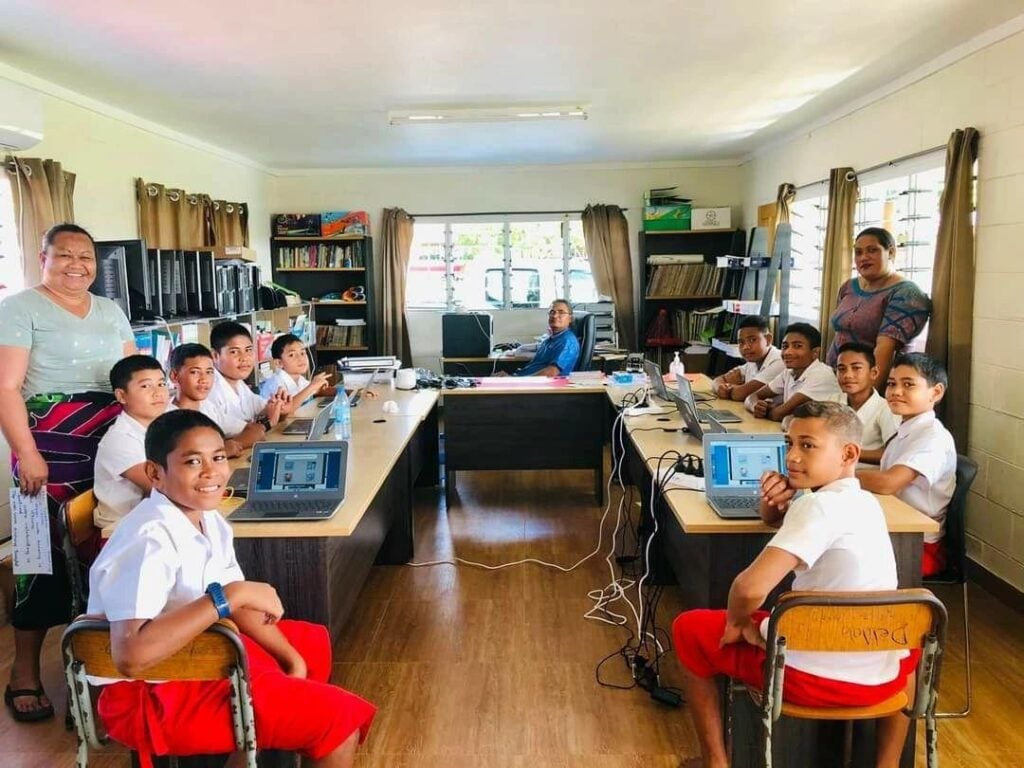
Promoting Gender Equity: The project made significant strides in gender inclusion. Nearly half of the 953 students participating were female, marking a substantial increase in female engagement in STEM fields. This was a crucial step in breaking down gender barriers in traditionally male-dominated areas.
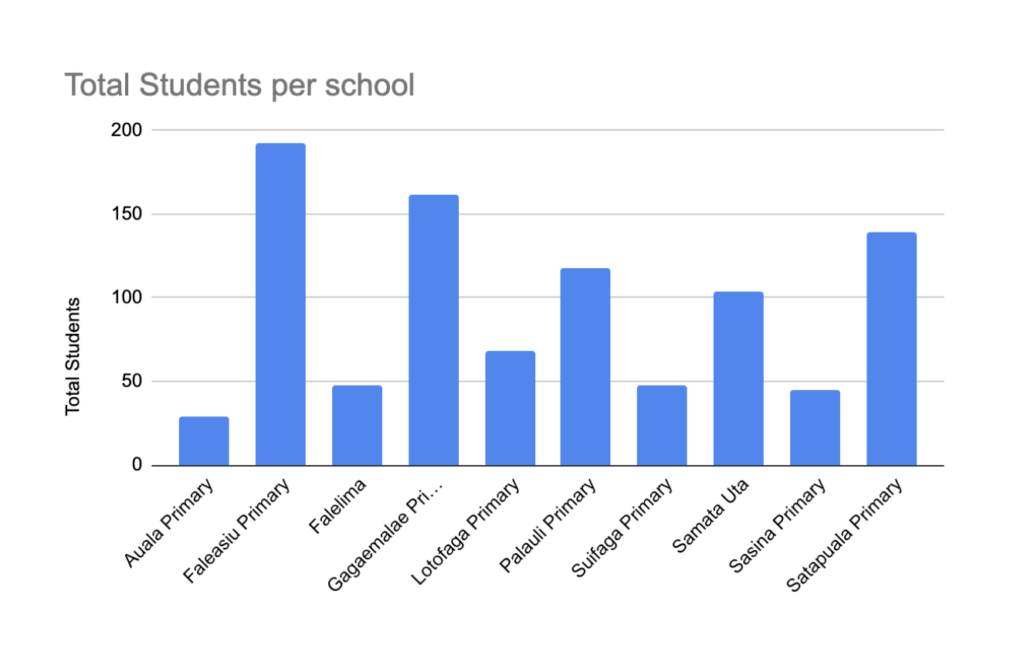
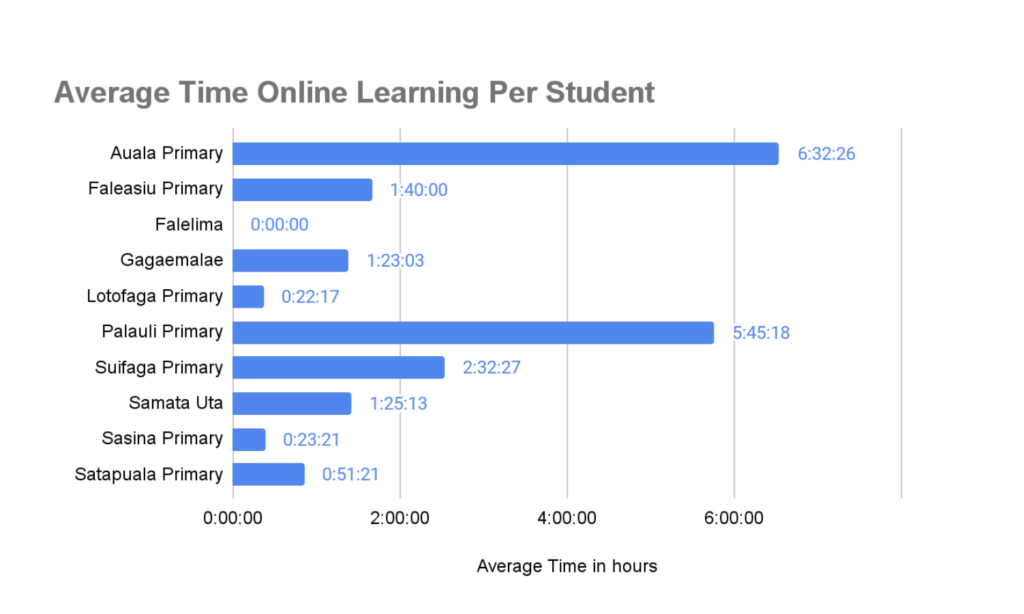
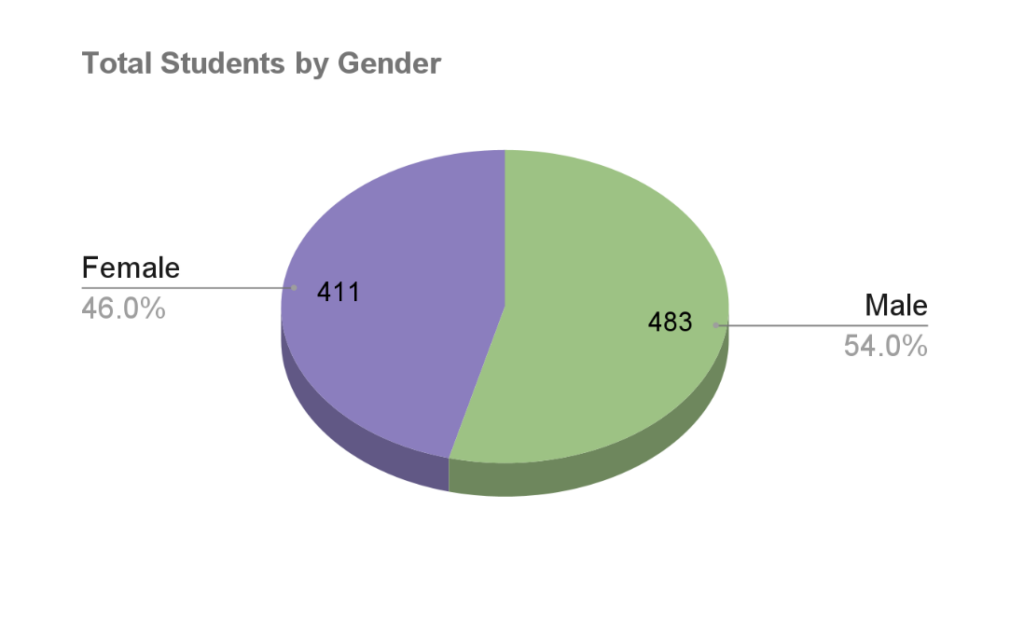
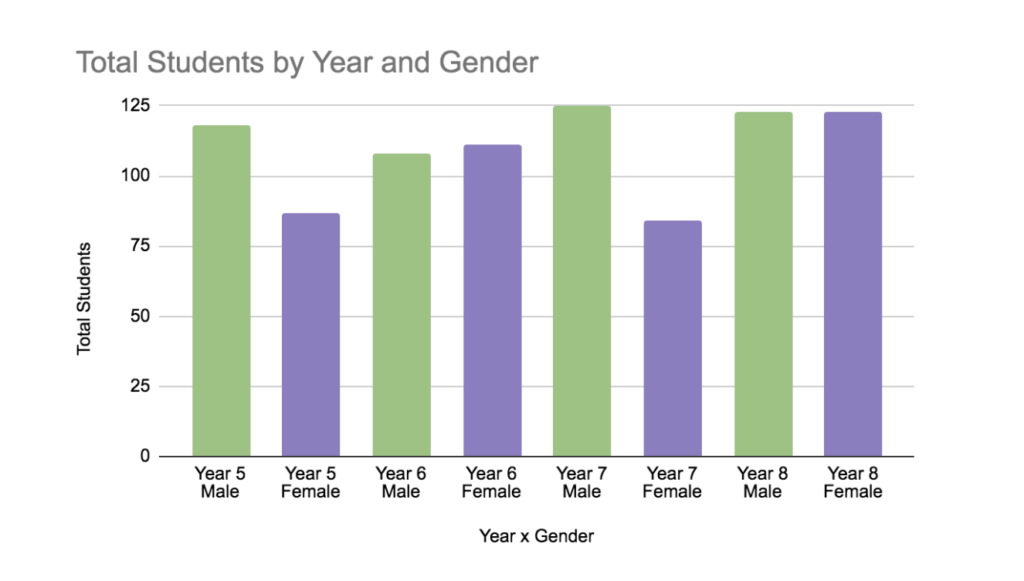
Community Engagement and Awareness: The project team actively engaged with local communities, especially in remote areas, to raise awareness about the importance of digital education and the opportunities it presents, particularly for female students.
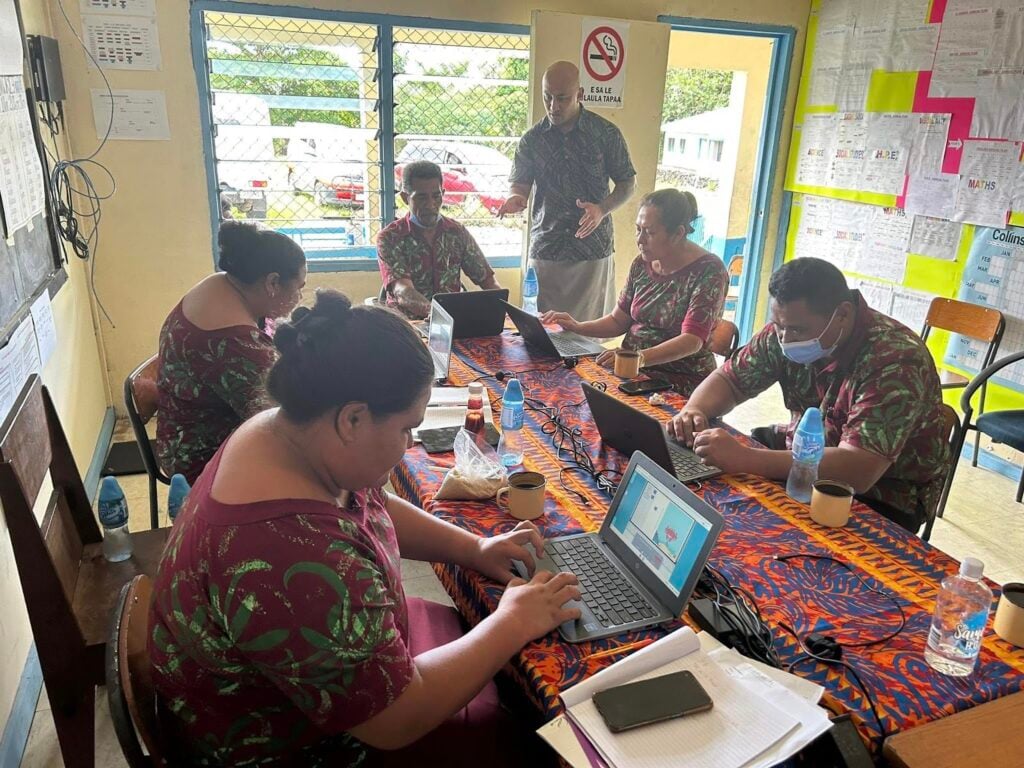
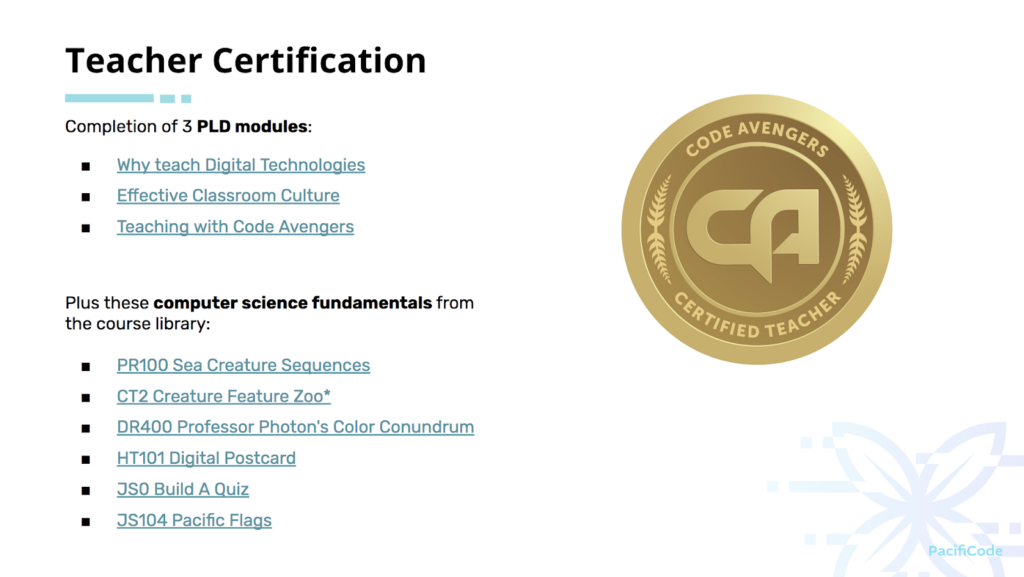
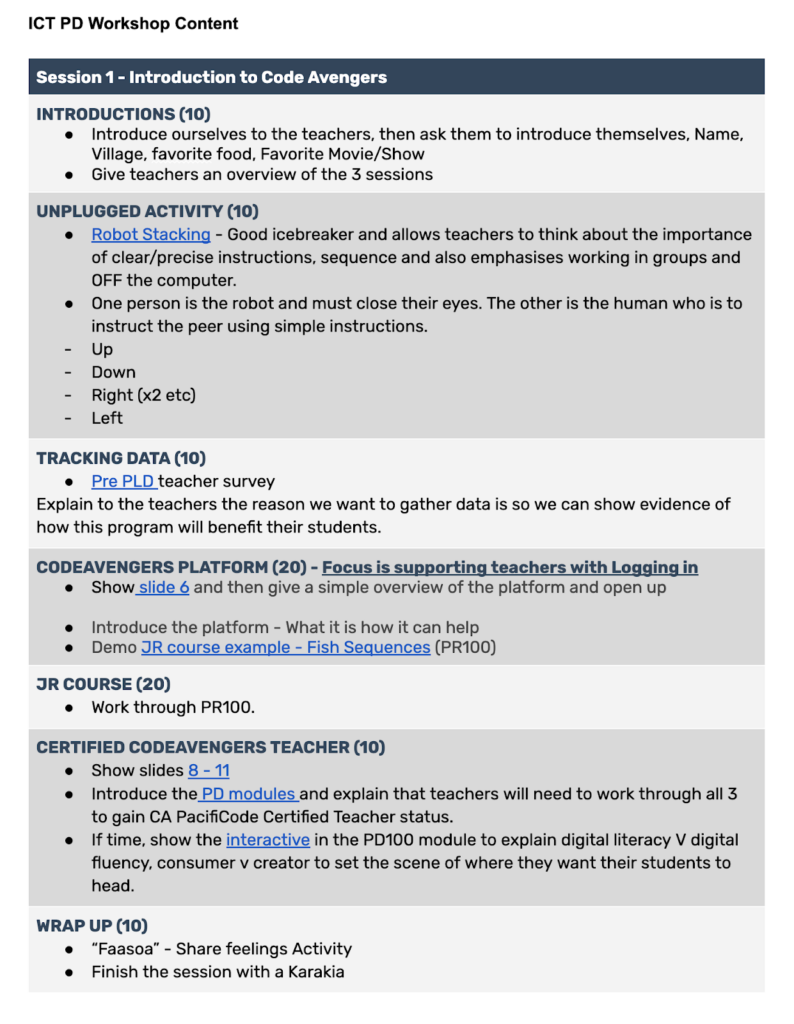
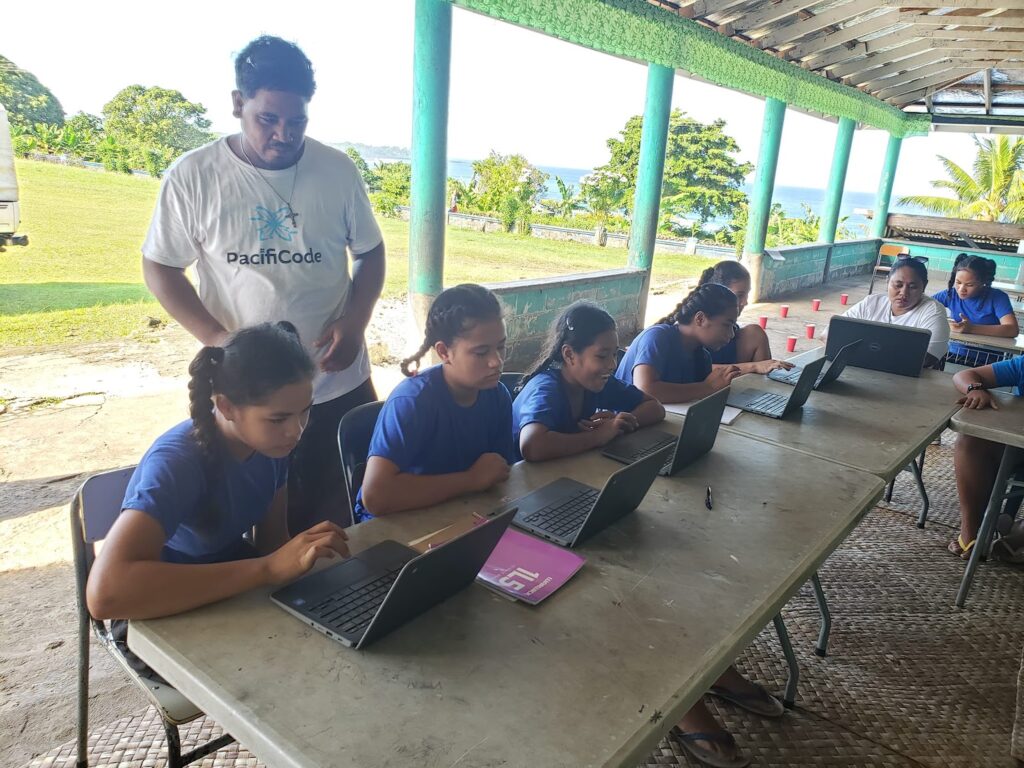
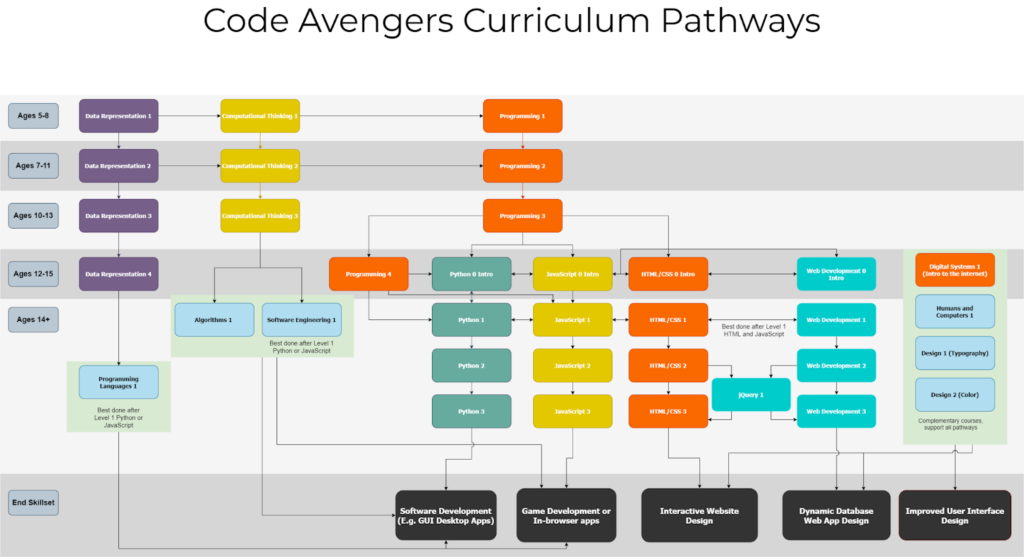
Project Design:
Community Needs Assessment: The team began with a thorough assessment of the community's needs, focusing on the lack of digital skills and underrepresentation in STEM fields, especially in remote and rural areas of Samoa. They identified key challenges such as limited access to digital resources, lack of trained educators in ICT and Digital Technologies (DT), and gender disparities in STEM education.
Inclusive Planning: The project was designed to be inclusive, taking into account the cultural, educational, and infrastructural specifics of Samoa. The team consulted with local educational authorities, school principals, teachers, and community leaders to ensure the project's objectives aligned with the community's needs and aspirations.
Implementation:
Local Facilitator Engagement: Local facilitators were trained to deliver the Code Avengers certification program, ensuring that the project was grounded in local context and expertise. This approach not only built capacity within the community but also ensured the sustainability of the project.
Resource Allocation: Understanding the infrastructural limitations, the project provided 111 high-quality laptops and three years of internet data to the 10 pilot schools, making digital education accessible.
Teacher Training and Empowerment: The project focused on empowering local teachers through the Professional Learning Development Certification Program in ICT/DT. This training equipped teachers with the skills to integrate technology into their teaching, thereby enhancing the quality of education.
Gender Equity Focus: The team actively worked to increase female participation in ICT/DT through targeted strategies, addressing the gender gap in STEM fields. Engagements included community meetings to raise awareness about the importance of female education in technology.
Community Engagement: Regular community meetings and town hall sessions were held to keep the community informed and involved. These sessions served as platforms for feedback, ensuring the project remained aligned with the community's evolving needs.
Monitoring and Adaptation: Continuous monitoring of the project's impact allowed the team to make necessary adjustments, ensuring that the project remained effective and relevant to the community's needs.
Celebrating Successes: The project team celebrated milestones, such as the certification of teachers, in school assemblies, fostering a sense of community achievement and pride. The PacifiCode Digital Fluency Project team's engagement with the Samoan community has been holistic and adaptive, ensuring that the project not only addresses the immediate digital literacy needs but also contributes to long-term educational and social transformation. By involving local stakeholders at every stage and focusing on sustainable, inclusive education, the project stands as a model for community-centered digital education initiatives.
The PacifiCode Digital Fluency Project:
Introduction to the Project:
The PacifiCode Digital Fluency Project, aimed at enhancing digital literacy in Samoa, particularly in remote and rural schools, faced various challenges and underwent significant adaptations during its implementation. This report outlines the partnerships formed, the struggles encountered, and the adjustments made to achieve the project's objectives.
Partnerships:
APNIC Foundation: The project was primarily funded by a $150,000 USD Impact Grant from the APNIC Foundation, which provided the financial backbone for the initiative.
Local Educational Authorities, Schools and other Governmental Ministries: The project worked closely with local educational authorities and the 10 pilot schools. These partnerships were crucial for understanding the local educational landscape and for the successful implementation of the ICT/DT programs.The project also gain the attention of the Ministry of Women, Community and Social Development who are responsible for the 51 district offices through out Samoa. With this ministry we are working on the viability of running ICT/DT After school programs out of the district community offices.
Community Leaders: Engagements with chiefs, church leaders, and parents in community meetings helped in gaining trust and support for the project, ensuring community buy-in and addressing the gender gap in STEM education.
LiteHaus International: Donated a further 300 laptops to be supplied which we have supplied to the 10 pilot schools and also gifted remaining laptops to 20 other schools.
Challenges and Adaptations:
Infrastructure Limitations: Initially, the lack of digital infrastructure in remote schools was a significant barrier. The project adapted by sourcing and installing 111 computers and providing internet data, thus overcoming this hurdle.
Teacher Training Challenges: The initial plan for in-person training faced obstacles due to logistical issues and varying levels of teachers' digital literacy. The project shifted to a blended training model, of content and e-learning platform onboarding, to accommodate these differences.
Engaging Female Students: The project initially struggled to engage female students due to cultural and societal norms. By involving community leaders in the dialogue and focusing on gender equity in all aspects of the project, these challenges were gradually overcome.
Feedback and Continuous Improvement: Regular feedback from teachers, students, and community members led to ongoing adjustments in project strategies, ensuring that the project remained responsive to the community's needs.
The PacifiCode Digital Fluency Project's journey was marked by collaborative efforts with various partners, adaptive strategies to overcome challenges, and a commitment to continuous improvement. The partnerships with organizations, researchers, and community leaders were instrumental in navigating the complexities of implementing a digital literacy project in a diverse and dynamic environment. The project's ability to adapt to changing circumstances and feedback has been key to its success, setting a precedent for future initiatives in similar contexts.
Project review and assessment
The Project has successfully achieved its Objectives: The $150,000.00 APNIC Foundation Impact Grant has had a substantial impact on the small Island nation of Samoa. Building capacity of 5 in-country facilitators, including Teacher Professional Development a sustainable ICT After School program that has impacted 953 students so far and will continue for many years to come and will make a significant impact in ICT Higher Education numbers including higher female participation.
The Samoan government's active interest in broadening the scope of this pilot project underscores its potential for transformative impact Teacher ICT/DT PLD: 40 out 62 participating teachers have gained their ICT/DT PLD Certification- (The remainder are on the pathway and should gain their certification in the next 2 months)
Capacity Building: Our In-country Partner E3 Samoa has increased capacity and capability. Their five Facilitators are now able to train teachers to a high level of Digital Fluency, thereby empowering their schools' digital curriculum Connectivity: 111 Laptops supplied throughout our Pilot schools and 3-year data packages for each school allotted monthly Gender Inclusion: Almost 50% of the 953 students enrolled and participated in the After-school ICT/DT program were females (411 females).
Significant progress has been made in various aspects of the project. The team of E3 facilitators actively participated in the online professional development program during March/April. The completion of the certified teacher program enhanced their proficiency in navigating the platform and using teaching tools ensuring they were ready to support teachers during the workshops.
The Code Avengers facilitator led the delivery of the first two school workshops. The expertise and guidance provided by an experienced facilitator were invaluable in modelling best practices for the E3 team. He discovered early on that the ICT curriculum in Samoa is more simplified compared to New Zealand, with a focus on computer usage and e-learning platforms for students. He quickly adapted the program to meet the needs of the teachers. The workshops were streamlined by reducing the content covered and prioritizing familiarity with the platform.
40 teachers achieving the Code Avengers certified teachers program. They were introduced to the requirements of the program and are now required to engage in self-directed learning. To continue engagement and motivate teachers to complete this. We are implementing an inter-school competition promoted through a private Facebook Group and a WhatsApp group. Teachers who demonstrate exceptional performance toward achieving their certification will receive additional laptop incentives.
The Honourable Prime Minister, Fiamē Naomi Mata‘afa, and Seuula Ioane Tuā'au, Minister of Education, Sports, and Culture attended the launch at the second school, Lotofaga Primary School. The support and involvement of these influential government figures have demonstrated the potential for the project's expansion to all 120 schools with satellite internet connections in Samoa. The VP of APAC used his time in Samoa to present to various government agencies the benefits of adopting a robust ICT teaching model.
The E3 Samoa team (local partner) has shown high levels of confidence and independently delivered the program to two other schools. One notable finding was the increased impact and comprehension when the workshops were delivered in Samoan, which has been highly beneficial for participating teachers. Teachers rated the facilitators as helpful and knowledgeable.
Reliable Internet access has been established in all 10 schools through satellite connections. Four out of the 10 schools now have the necessary resources, including laptops, Internet access, and access to the Code Avengers e-learning platform and all its learning resources. It is encouraging to see that already 34 teachers have logged onto the Code Avengers and received basic training on how to use the platform in their classrooms.
Teachers have reported finding the workshops highly useful, with increased confidence in the topics covered. They reported an increase in their teaching capability for ICT programs such as block-based and text programming, and they expressed a strong likelihood of implementing ICT programs in their classrooms.
The adoption of paper surveys (pre-and post) has yielded a much higher response than using e-surveys.
Provided the content team with an insight into what resonated with the teachers. Many of the open-question comments mentioned that their favourite part of the program includes learning about tracking tools such as creating classes, assigning work and monitoring progress.
Some comments included;
“Code Avengers will offer a new pathway for learning and the platform is user-friendly”
"This training is much needed, I was nervous at first but the facilitators have done a good job in teaching these concepts, in a fun way"
“It was fun and useful for teacher learning and teaching within classrooms. Games and instructions are clear and interesting.”
Many of the teachers indicated they would like more training. E3 has been providing support as teachers have progressed through the certification program. Follow-up visits to all 10 schools each fortnight were essential to provide guidance on structuring the after-school DT/ICT programs, with a focus on engaging female students.
As well as the surveys the content team debriefed all the facilitators after each school, to ensure the program was fit for purpose and to highlight any changes that needed to be implemented to improve future performance. Some of our recommendations were:
- Translating the handouts and some of the course instructions into Samoan.
- Providing Samoan context to explain some of the teaching strategies.
- Providing the teachers with clear pathways for course completion to successfully direct their students.
- Inviting the E3 team to our Slack channel to decrease the fragmented communication channels.
The project has been a success, with significant progress made in various aspects. The E3 team (In-country partner) has shown high levels of confidence and independently delivered the program to two other schools. Teachers have reported finding the workshops highly useful, with increased confidence in the topics covered. They reported an increase in their teaching capability for ICT programs such as block-based and text programming, and they expressed a strong likelihood of implementing ICT programs in their classrooms.
The project is valuable to us because it is helping to improve the ICT skills of teachers in Samoa, which will in turn benefit the students. The project is also helping to raise awareness of the importance of ICT education in Samoa.
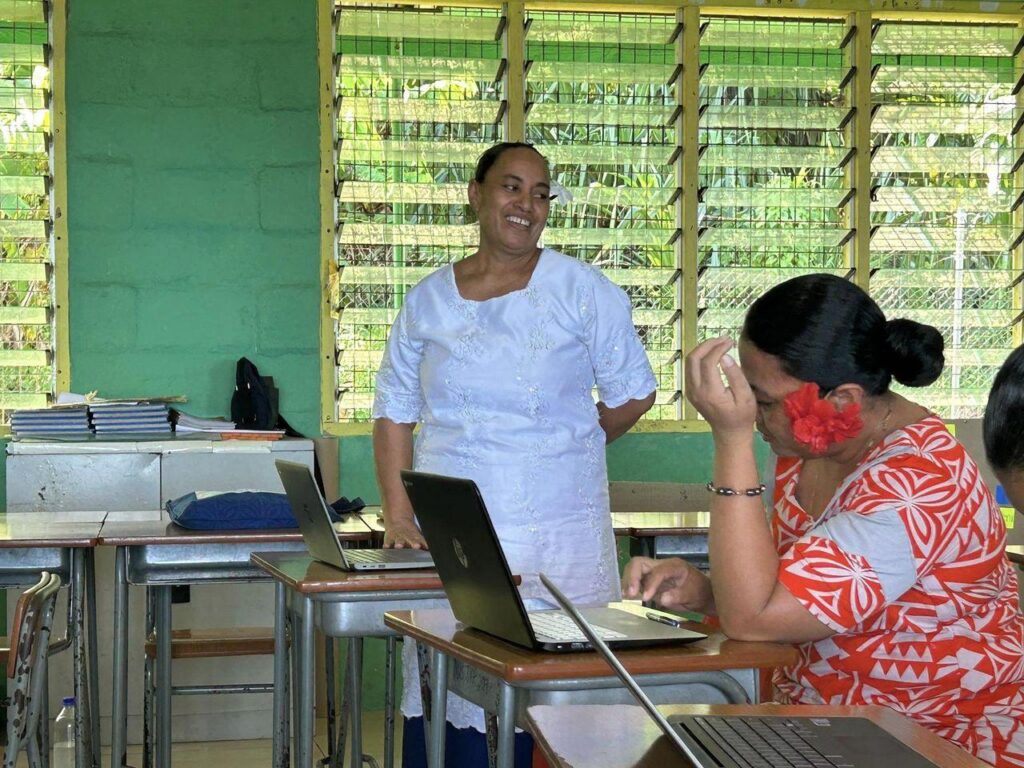
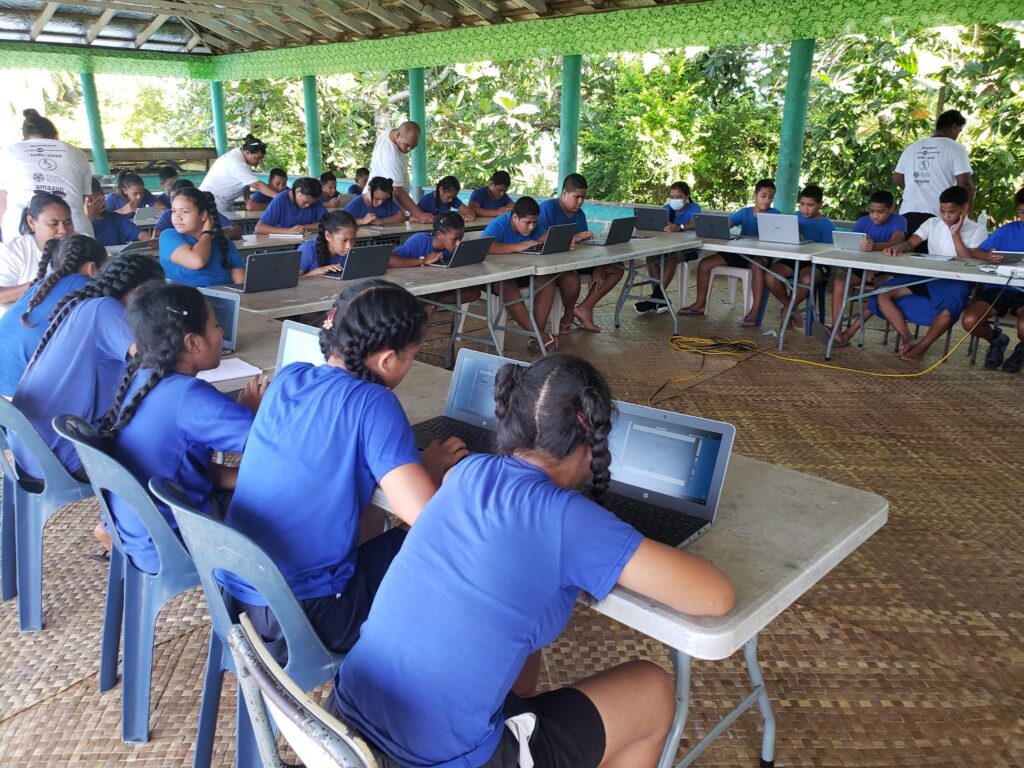
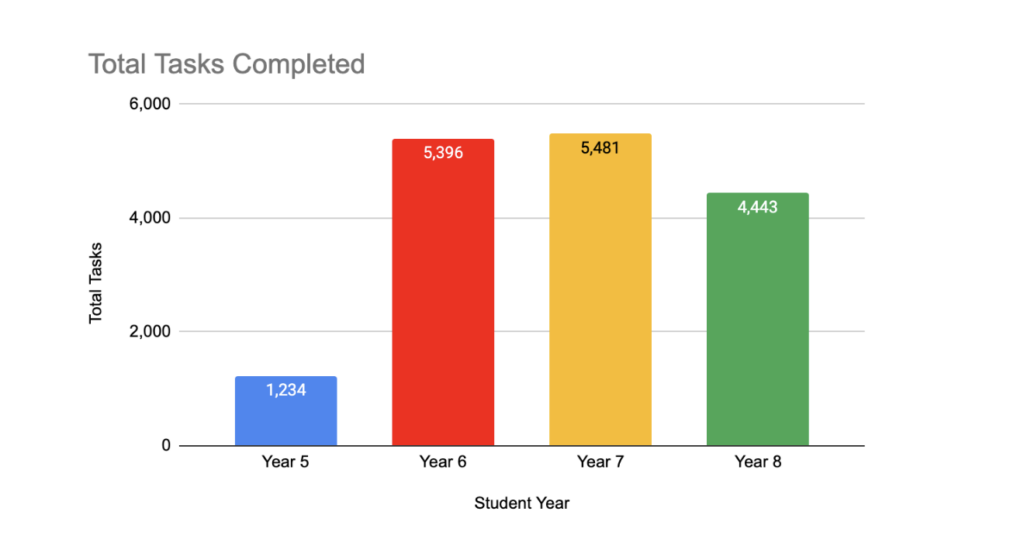
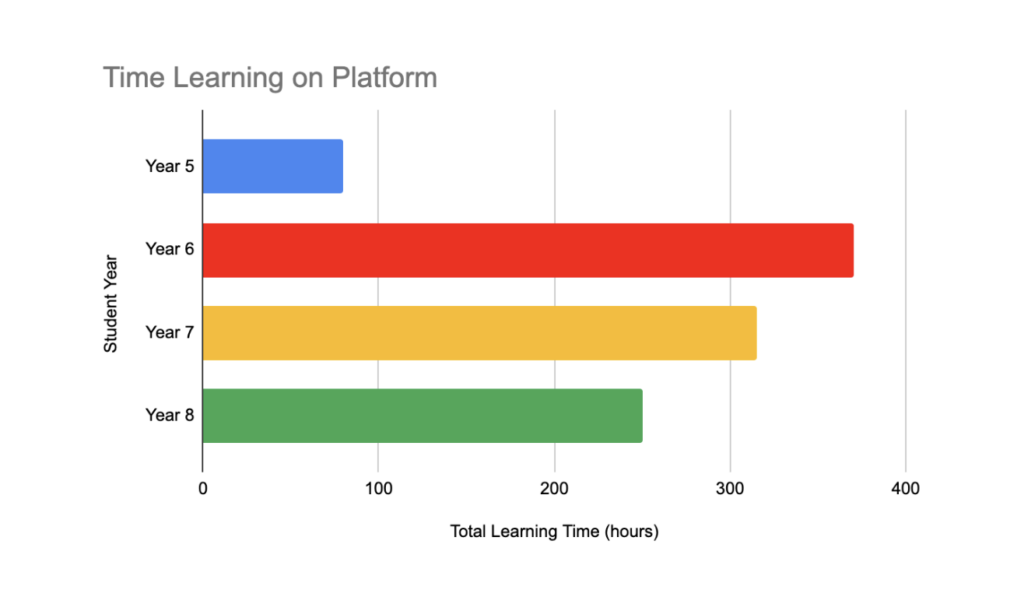
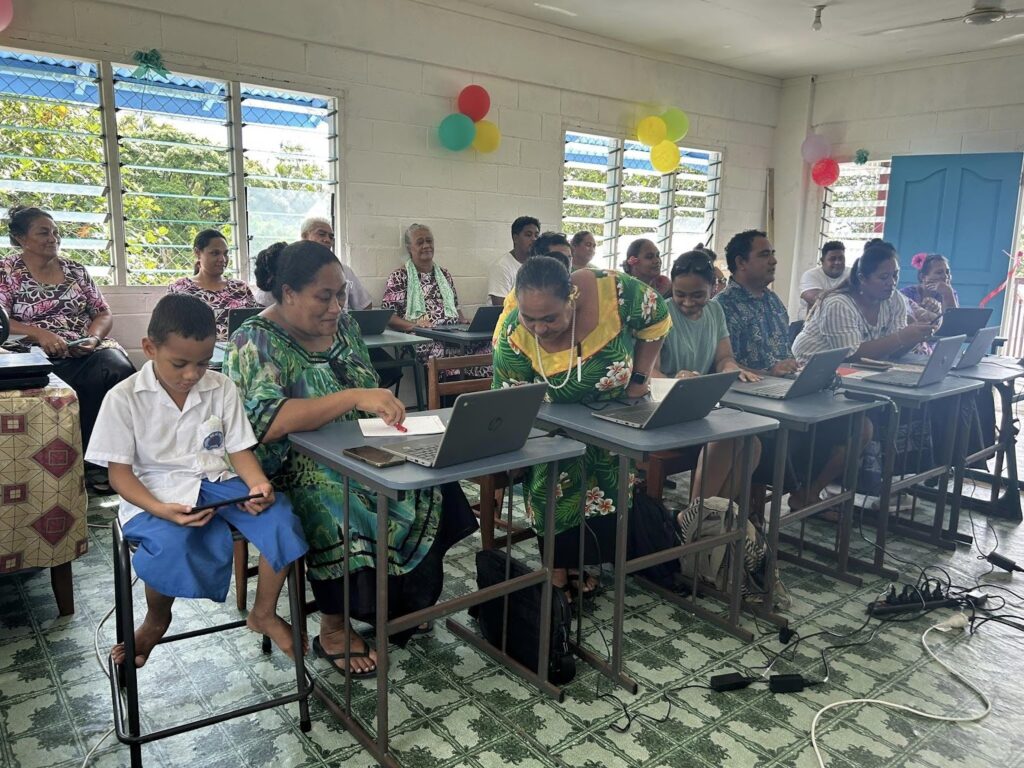
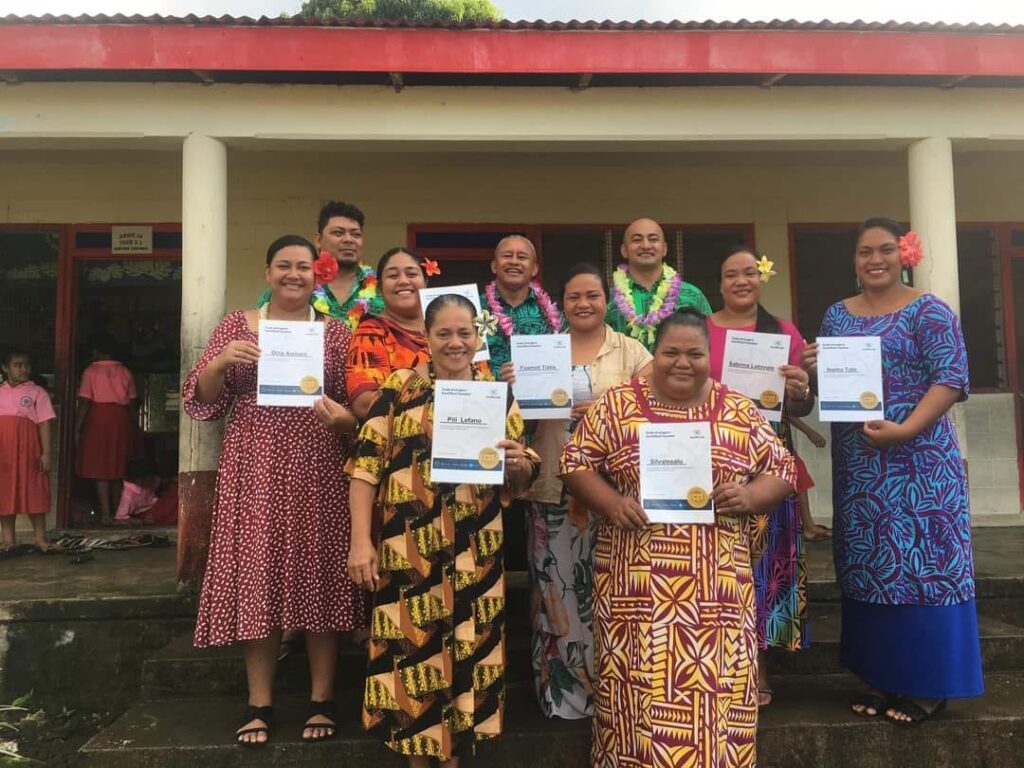
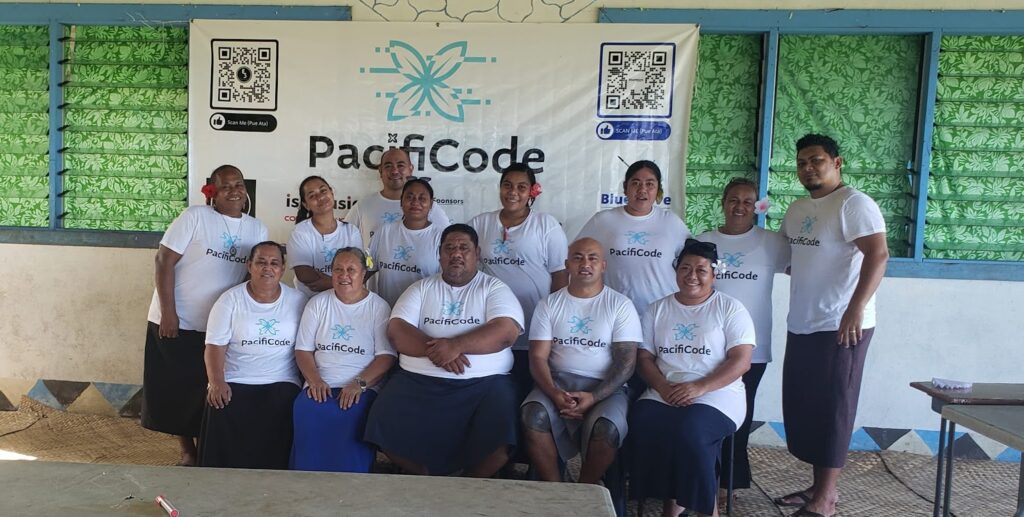
Gender equity and inclusion
We allocated a portion of the project funds to travel to remote schools in Samoa, where we actively engaged with local communities. This engagement involved organizing community meetings/ town hall meetings with key local figures, including chiefs, church leaders, principals, teachers, and parents.
During these meetings, we shared the project's vision and highlighted the opportunities available for their schools and students to implement their own ICT after-school programs. Our in-country team used these gatherings to raise awareness about the underrepresentation of girls in STEM fields and emphasized how this project presents an exceptional opportunity for their daughters to participate and excel in these areas.
We aimed to ensure that every student, irrespective of gender, had equal access to digital education. We are pleased to report that our efforts have borne fruit. Of the 64 teachers from the 10 pilot schools 55 of them were female teachers. 46% of the total participating 953 students were female, we were happy to see that females also had the highest engagement, on the e-learning platform, with over 100 hours of learning recorded then there male counterparts. Not only are they participating, but they are excelling, and outperforming their male counterparts in several courses.
This achievement underscores through championing female inclusion we were able to have high female participation and highlights the untapped potential of our female students.
9/10 schools are remote and rural schools often isolated by their location, and six of the participating schools were on the more underdeveloped and rural Island of Sava'ii, the team made an effort to reach into these rural schools as we know that these schools and students are often forgotten due to their location and lack of infrastructure.
The project team consisted of five males and three females. The females were driving the content creation, managing the project and conducting ICT facilitation training via online video conference. Our proactive approach to the inclusion of female students has borne fruit.
The female participation is inspiring, as female students are engaging and progressing in all courses, especially in programming (PR100, PR2, PR3) and computational thinking (CT200, CT2). Female students, in particular, have showcased an impressive knack for digital language comprehension and platform navigation. An observation from an E3 facilitator encapsulates this: “The girls not only picked up quickly but also showcased an innate ability to understand digital language and adeptly navigate the digital platform. They were so engrossed that teachers often had to intervene to get them to take breaks from their devices.”
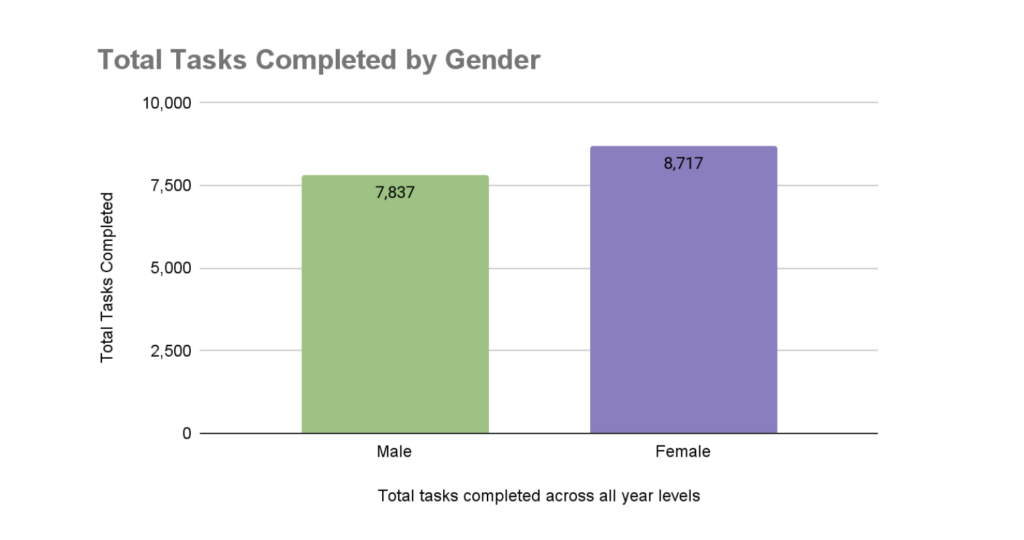
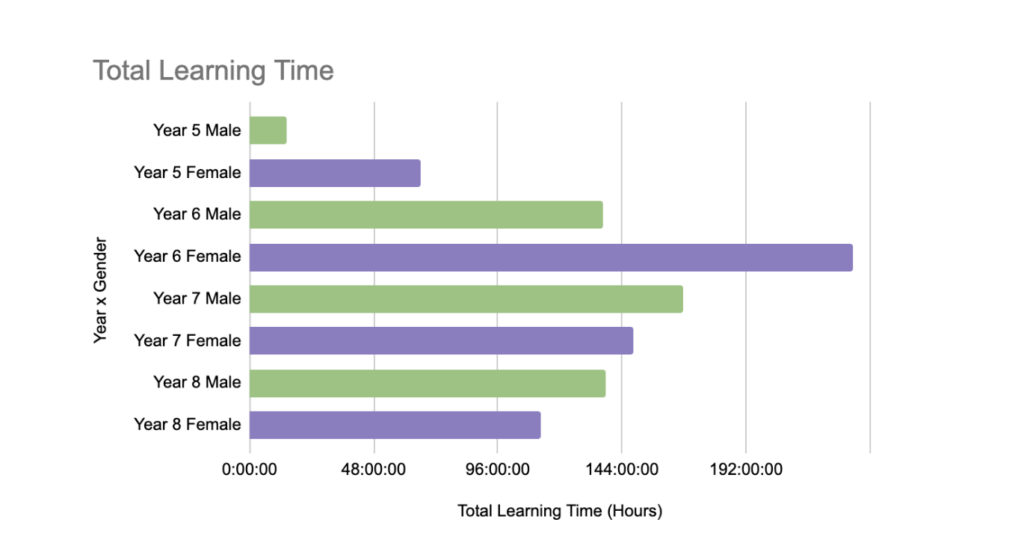
Armed with the tools and skills imparted through the Project, the aim is that female students are not just participants but will go on to engage with ICT/DT at High School and higher education
High Female Participation: Nearly half of active users on the e-learning platform are young women.
Female students excel in traditionally male-dominated courses like programming and computational thinking.
Empowerment: Equipping young women with skills for diverse career opportunities and positioning them as potential future leaders. Girls' strong engagement with the program made it a positive challenge for them to step away from their laptops. Girls spent 100+ hours more on the platform & completed 1000 more tasks than their male counterparts Female students demonstrated higher engagement in the Computational Thinking courses.
The APNIC Foundation Impact grant through the PacifiCode Project has significantly advanced gender equity in Samoa's digital education. Our targeted efforts in remote schools led to a notable increase in female participation: 46% of 953 students were girls, who not only engaged more but also outperformed their male counterparts in key areas like programming and computational thinking. This achievement highlights the project's success in breaking down gender barriers in STEM education, funding from the Foundation was directly spent on community workshops to raise awareness about inclusion and with supporting meetings after the teacher training workshops reminding and companion teachers to include female students.
Additionally, female students demonstrated exceptional digital proficiency and a strong commitment to learning. The project's impact extends beyond mere participation, empowering young women with vital skills for future careers and leadership roles. Overall, the PacifiCode Project has set a new standard for inclusive digital education, showcasing the untapped potential and empowerment of female students in Samoa. As the project expands to more schools the impact will be transformative, and will eventually directly impact the number of females with foundational digital skills, females in the Tech sector and the hope is more female tech entrepreneurs.
Project communication
The PacifiCode project undertook a variety of communication and dissemination efforts to promote its activities and achievements. These efforts were pivotal in raising awareness and engaging a broader audience, both locally and internationally. The project's communication strategy was multifaceted, encompassing digital outreach, visual branding, community engagement, and strategic planning. Many of the activities did not cost any anything except for time, but a portion of project funds was used for visual branding, travel to and from remote communities to hold town hall meetings with communities leaders, teachers and parents.
Digital and Media Outreach:
Social Media Engagement: The project consistently updated its LinkedIn and Facebook pages, showcasing key milestones and engaging with a diverse audience. This approach helped in maintaining a dynamic and interactive online presence.
Press Release: A press release was issued at the project's inception, effectively highlighting its objectives and potential impact. This garnered attention from local media, leveraging networks in both Samoa and New Zealand, which was particularly significant given the large Pacific diaspora in New Zealand.
Visual Branding and Presence: Custom T-Shirts and Banners: These were designed featuring the project logo, enhancing visibility during events, workshops, and community gatherings.
Photographic Documentation: Group photos with banners and t-shirts were utilized to bolster visual storytelling and enhance project awareness.
Community Engagement: Local Community Involvement: The project team held meetings with community leaders and participated in local events and focus groups, school, to foster deeper community connections.
Stakeholder Presentations: Presentations were made to cabinet members, school communities, and boards, providing updates on the project's progress and its impact.
Communication Strategy: The initial press release and subsequent social media posts at each project milestone or highlight ensured continuous engagement and positive public relations. For instance, business social pages shared updates, which were then amplified by business leaders and team members. This approach led to frequent engagement and excellent PR. We had a milestone or highlight weekly most times bi weekly so the project has had a lot of engagement and great PR.
For example our business social pages would share then it would be picked up by our business leaders and team members to be shared via social then from there we released social posts as we hit each milestone or highlight in the projects. We originally released a press release at the beginning of the project which local media picked up on.
Recommendations and Future Planning: Ongoing Engagement: The project emphasized continuous engagement with participating schools, supplying resources for teachers to effectively communicate with students and parents.
Awareness and Advocacy: The team presented at various conferences, workshops, and events to advocate for the project and its objectives.
Project Impact and Adaptation: The project's impact on students and teachers was regularly assessed, with strategies adapted to meet evolving needs and challenges.
Sharing Lessons and Findings: Findings were documented and shared with other organizations and practitioners in the field. These insights were crucial in informing decision-making during the reporting period, ensuring that the project remained responsive to the needs of the community and the evolving educational landscape.
We shared project findings with the following organizations:
Samoan Ministry of Education & Culture - Who are supportive of the expansion of the project either through the government schools, the 51 district offices and/or the homework centres
Samoan Minsitry of Agriculture - who were very interested in our data collection methods
Samoan Ministry of Women, Community and Social Development- were interested in potentially setting up the after school ICT program at the 51 district offices across Samoa
New Zealand High Commissioner to Samoa- Who awaits engagement from the Samoan Government if needed
New Zealand Ministry Of Foreign Affairs- Pacific Connections team who are intrigued in this project as a potential framework for other Pacific Island Nations
Pacific Cooperation Foundation - who have asked us to share our findings across their development network in the Pacific
Community Feedback Integration: Feedback from the community was actively sought and integrated, ensuring the project's alignment with local needs and expectations.
Future Communication Strategy Development: A comprehensive communication strategy was planned for development post-Marketing Manager's return, focusing on broader outreach and sustained engagement.
The PacifiCode project's communication efforts were successful in using various channels to promote its activities and engage the community. The lessons learned and findings from the project were instrumental in shaping decision-making processes, ensuring that the project continued to resonate with and positively impact the lives of students and teachers in Samoa.
Project recommendations and use of findings
These recommendations highlight how the project's findings and lessons learned can directly inform and enhance the final stages of the project. By incorporating these insights, the project team is able to make more informed decisions, share valuable information with other organizations, and leverage the project's outcomes to shape future planning and implementation strategies.
Partner with local organizations: In our case, partnering with E3 was essential to the success of our project. They had the local knowledge and relationships that we needed to get things off the ground and to drive the project locally.
Be flexible and adaptable: Things don't always go according to plan, so it's important to be flexible and adaptable. We had to make a number of changes to our original plan as we learned more about the situation in Samoa.
Build relationships with teachers: The teachers are the key to the success of any ICT education program. We made a point of building relationships with the teachers in Samoa and getting their input on our program.
Provide ongoing support. ICT education is not a one-time event. It's important to provide ongoing support to teachers and students so that they can continue learning and growing.
Essential Role of Community Engagement in Advocating for Transformative Change: Achieving transformative change often hinges on the level of community buy-in and ownership. When initiatives are deeply rooted in the community, they resonate more powerfully with government bodies. It's the collective voice and concerted efforts of the community that capture the attention of policymakers, making them more receptive to calls for change. This grassroots-driven approach ensures that the push for transformation is not perceived as an external imposition but as a genuine reflection of the community's needs and aspirations. When the government sees that a movement or a change initiative is organically grown and supported by its constituents, it lends greater credibility and urgency to the cause. In essence, the key to effective lobbying for significant governmental shifts lies in the hands of the community. Their active involvement, persistent advocacy, and unified stance are instrumental in turning the tide towards meaningful and lasting change.
The project findings and lessons learned are informing our future planning for our organization. We are working to expand our ICT education program to reach more schools and students in Samoa. We are also working to develop new resources and training materials to support teachers and students.
The project findings and lessons learned have significantly influenced decision-making in the following ways:
The teachers in Samoa were not familiar with eLearning programs. This led us to make changes to our training program to make it more accessible to them.
The feedback from facilitators highlighted the importance of clear instructions and overcoming language barriers. As a result, we implemented verbal translations and are working to translate materials to ensure effective communication and inclusive learning experiences.
The initial focus on Computer Science training was shifted to prioritize familiarity with the platform based on participants' needs. This adjustment allowed teachers to engage with the courses needed for certification in a self-directed capacity. Furthermore, the project will incentivize teachers to pursue the certification by providing laptops, addressing the challenge of limited resources, and promoting their active engagement in the certification program. This approach aims to empower teachers, enhance their digital fluency, and improve the quality of ICT education delivered to students.
Enhanced Impact Through Strategic Collaboration: The collaboration between smaller-scale development funders such as ISIF Asia/APNIC Foundation and larger-scale funding entities holds immense potential for amplifying the impact of developmental projects. This synergy is not just about pooling financial resources but about creating a cohesive ecosystem where projects can be nurtured from inception to scale.
Streamlining the Funding Pathway: Small to medium funders often serve as the initial stepping stones for innovative projects, providing the crucial support needed in the early stages. By establishing a direct line of communication and recommendation with larger funders, these projects can transition more seamlessly into phases of expansion and wider impact.
Maintaining Momentum and Energy: Projects often face a critical juncture where initial funding is exhausted but their potential is yet to be fully realized. This is where the collaboration can be a game-changer. By ensuring that projects recommended by smaller funders are given due consideration by larger entities, the momentum and energy of these initiatives can be maintained, preventing stagnation.
Creating a Continuum of Support: This collaborative approach creates a continuum of support for projects, from ideation to large-scale implementation. It ensures that projects are not just supported financially but are also guided through various stages of their lifecycle.
Enhancing Impact and Scalability: By aligning the goals and resources of both small and large funders, the overall impact of developmental projects can be significantly enhanced. Projects that might otherwise falter due to lack of resources can achieve scalability and a broader impact.
Facilitating Knowledge and Resource Sharing: This collaboration fosters an environment of knowledge sharing, where learnings from smaller projects can inform larger-scale implementations. It also allows for the sharing of resources, be it technical expertise, networks, or strategic guidance.
Building a Stronger Ecosystem for Development: Such collaborations contribute to building a stronger, more interconnected ecosystem for development projects. It encourages a more holistic approach to funding, where the focus is not just on individual projects but on creating a sustainable environment for continual growth and impact.
The collaboration between small to medium development funders and larger scale funders is crucial for the sustainable growth and scalability of impactful projects. By working together, these entities can ensure that promising initiatives receive the support they need at every stage, ultimately leading to more significant and lasting impacts in the communities they serve.
Bibliography
This full report, together with additional supplementary materials including reference notes and bibliography is available for download as a PDF.
Full report and bibliography [PDF].
This work is licensed under a Creative Commons Attribution-ShareAlike 4.0 International License 


